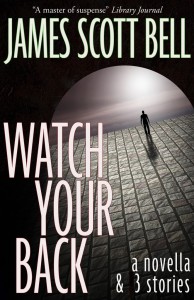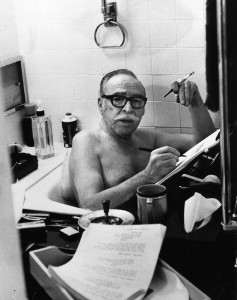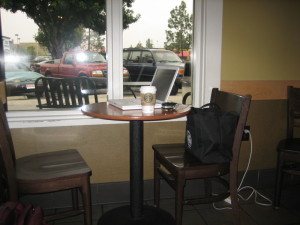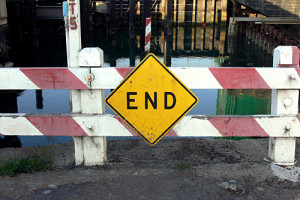Category Archives: starbucks
How to Eat the Publishing Elephant
James Scott Bell
Twitter.com/jamesscottbell
Where Do You Write?
Then again, would that be too distracting? Would I spend more time gazing than writing? Maybe my home office, with the blinds closed and the familiar mess surrounding me, is still the better idea.
How to Write Your Last Page
It’s been a heady couple of weeks doing first pages here at TKZ. So I thought, just to catch our breath and balance things out, maybe we should go the other way for a moment.
What about your last page?
I love the Mickey Spillane quote: “The first page sells your book. The last page sells your next book.”
How true that is. How many times have we begun a novel or movie, only to be let down when the book is closed or the credits roll?
I love beginnings. Beginnings are easy. I can write grabber beginnings all day long. So, I suspect, can you.
But endings? Those are hard.
Why? First, because with each passing day another book or movie has come out, another ending has been rendered. So many great endings have already shown up. We who continue to write have the burden of trying to provide satisfactory surprise at the end when so much ending material is already out there.
Second, our endings have to tie things up in a way that makes sense but is also unanticipated. If the reader can see it from a mile away, the effect is lost.
I like what Boston University writing teacher Leslie Epstein said in a recent Writer’s Digest piece (“Tips for Writing and for Life,” WD March/April 2010). When asked if a writer must know the ending before he starts, Epstein says, “The answer is easy: yes and no. One must have in mind between 68 and 73 percent of the ending.”
Epstein’s having a bit of fun here, but his point is solid. If you have the ending 100% in mind, you’re in a straitjacket, unable to let your story sufficiently breathe, or twist, or turn.
OTOH, if you don’t have any idea where you’re going, you could easily fall into the meander trap, or the backed-into-a-corner trap.
There are some very helpful techniques for writing a great ending. Joe Moore discussed some of these last month. Type “endings” in the search box in the upper left of the blog, and you’ll get other thoughts by my blog mates. And I’ll humbly mention that I have also treated the subject in Plot & Structure.
But rather than focusing on principles, today I want to offer you my own personal approach to writing endings. It’s called Stew, Brew and Do.
Why is it called that? Because I made it up so I get to name it.
Here’s how it goes:
Step 1: Stew.
I spend a lot of time at the end of a manuscript just stewing about the ending. Brooding over it. I’ve got my final scenes in mind, of course, and have written toward them. I may even have written a temporary ending. But I know I won’t be satisfied until I give the whole thing time to simmer. I put the manuscript aside for awhile, work on other projects, let the “boys in the basement” take over.
I tell myself to dream about the ending before going to bed. I write down notes in the morning.
Step 2: Brew.
When I am approaching the drop dead deadline, I continue to outline ending possibilities. I will have files of notes and ideas floating in my head. When I know I have to finish I use Brew in both a practical and metaphorical way.
I take a long walk. There is a Starbucks half an hour from my office. (In fact, there is a Starbucks half an hour from anyplace in the world). I put a small notebook in my back pocket and walk there and order a brew—a solo espresso. I down it, wait a few minutes and then start writing notes in the notebook.
Then I walk another half an hour, to another Starbucks (I’m not kidding). There I make more notes. If I have to, I have another espresso. I am a wild-eyed eccentric at this point, but I do have ideas popping up all over the place.
Step 3: Do.
I go back to my office and write until finished.
Well, it works for me. I like most of my endings, but they were very hard work to get to. But hey, that’s good. If this gig was easy, everybody’d be doing it, right? Be glad it’s as hard as it is. Your efforts will pay off.
So what works for you? Do you find endings hard? Or do they roll out of your imaginary assembly line fully functioning and ready to go?
What are some of your favorite endings? Or better yet: what endings, to movies or books, would you change?
Welcome to…THE KILL ZONE!!!
That sounds so ominous, doesn’t it?
So I drew the short straw for the inaugural Kill Zone posting. It’s a lot of pressure. I feel the need to write something weighty and momentous, a breathtaking post befitting the gravitas of a blog launch.
After a week of pondering, I’ve still got nothing. So in lieu of providing an illuminating perspective on an important issue, I’m going to do a whiny wrap-up of my recent book tour instead. With any luck, John and Clare have come up with something more impressive for their turn. A person can always hope, right?
And away we go…
My Book Tour, aka “Death March with Signing Pen”
Just to clarify, I’m not really complaining. I’m know that I’m lucky to have books published, luckier still that people appear to be reading them, and that foolish booksellers allow me into their stores armed with my bookmarks and refrigerator magnets. I love bookstores in general, and I’m a shameless performer, so the opportunity to get up in front of people and pontificate is something you’ll have to pry from my cold dead hands. That said, as I enter week four of my book tour (which I’ve officially dubbed “death march with signing pen”), I have come to notice the downside. I’m truly a homebody at heart; I love spending ninety percent of my time locked indoors with little but a keyboard for company. So being gone for extended periods of time is not only wearing, it makes me start missing things…
1. Food: I have no idea how a person manages to eat dinner during these tours. I leave my house around 5PM to get to most of these events, and then I generally get home around 10 or 11PM. Most local restaurants have closed by the time I’ve finished reading, and when I get home I don’t have the energy to assemble a bowl of cereal. Seriously, I haven’t had a hot meal in weeks. I’m wasting away. I’ve developed a theory that this is how Lee Child remains so svelte.
house around 5PM to get to most of these events, and then I generally get home around 10 or 11PM. Most local restaurants have closed by the time I’ve finished reading, and when I get home I don’t have the energy to assemble a bowl of cereal. Seriously, I haven’t had a hot meal in weeks. I’m wasting away. I’ve developed a theory that this is how Lee Child remains so svelte.
2. Television: I’m way behind on my programming. I’ve actually had to delete things from my Tivo UNWATCHED to make space for more critical shows. Which presents a horrible conundrum for me: though I have yet to watch the HD version of “The Science of Sleep,” I had intended to watch it someday. Will it be on again in the future? Can I really risk deleting it in favor of an episode of Project Runway? Which leads to my next concern: as far behind as I am on my regular series, I’m completely in the dark when it comes to reality shows. This might not seem grave to some of you, but when my husband has a better idea of who might win “So You Think You Can Dance” than I do, things have gone horribly awry.
Which leads to my next concern: as far behind as I am on my regular series, I’m completely in the dark when it comes to reality shows. This might not seem grave to some of you, but when my husband has a better idea of who might win “So You Think You Can Dance” than I do, things have gone horribly awry.
3. Company: I can pretty much guarantee that if you do more than a few tour stops with the same author, the two of you will quickly adopt the worst attributes of an old married couple. So it was with Simon Wood and I. Early on, we found each other charming. He chuckled at  my “accidentally killed off my main character” story, I gasped during his “trapped at an underground fight club in Tulsa” anecdote. But the bloom quickly faded, and by week three we were sniping at each other, rolling our eyes, and generally behaving like the main characters in “The War of the Roses.”
my “accidentally killed off my main character” story, I gasped during his “trapped at an underground fight club in Tulsa” anecdote. But the bloom quickly faded, and by week three we were sniping at each other, rolling our eyes, and generally behaving like the main characters in “The War of the Roses.”
4. Family: Granted, this should have come first. You know things are getting bad when your kid stops recognizing you. All right, I’m exaggerating (I am a writer, after all) but after being gone for five days, then heading out for a different corner of the Bay Area every night, it does become a little surreal. Plus, I reflexively tried to sign my name on my toddler the other day. Not good.
5. Beds: Of course, at times the beds have been the least of my problems. There was, for example, the Days Inn behind the strip club in San Diego, with all sorts of sketchy characters lurking in the corridor outside my room. But a month of sleeping on strange beds does tend to wreak havoc on my spine.
6. Flights: I’m not a nervous flyer; in fact I used to look forward to getting on a plane and going somewhere exotic. Now that I’ve spent the past four weekends getting on and off planes, I have  a few…let’s call them helpful suggestions…for the airlines. For instance, why not take off on time? I swear, I haven’t been on a trip in over six months that didn’t experience a two-to-five hour delay at the airport (or better yet, on the tarmac). And hey, is it really so difficult to have some form of nourishment available? I’ll pay for it; I would just love to be able to purchase that twenty-dollar mealy sandwich on the plane if I didn’t have the opportunity to grab one during my two mile-long sprint from gate 1 to gate 50 as I changed flights. And while we’re on the subject, consider turning off the seatbelt sign from time to time (an especially good idea during that three hour-long stint on the tarmac). When the person next to you maintains a running monologue on the size of their bladder, as the flight crew flips through celebrity rags and growls at anyone attempting to get out of their seats, it becomes abundantly clear that the glory days of civilian jetsetting have drawn to a tragic close.
a few…let’s call them helpful suggestions…for the airlines. For instance, why not take off on time? I swear, I haven’t been on a trip in over six months that didn’t experience a two-to-five hour delay at the airport (or better yet, on the tarmac). And hey, is it really so difficult to have some form of nourishment available? I’ll pay for it; I would just love to be able to purchase that twenty-dollar mealy sandwich on the plane if I didn’t have the opportunity to grab one during my two mile-long sprint from gate 1 to gate 50 as I changed flights. And while we’re on the subject, consider turning off the seatbelt sign from time to time (an especially good idea during that three hour-long stint on the tarmac). When the person next to you maintains a running monologue on the size of their bladder, as the flight crew flips through celebrity rags and growls at anyone attempting to get out of their seats, it becomes abundantly clear that the glory days of civilian jetsetting have drawn to a tragic close.
So, anyone else have war stories to share? Best comment receives a signed edition of my first thriller THE TUNNELS. If you don’t win, console yourself by signing up for my newsletter at www.michellegagnon.com and I’ll toss your name in the hat for an Amazon Kindle, iPod Shuffle, Starbucks gift certificates, and other fabulous prizes.
Michelle Gagnon is a former modern dancer, bartender, dog walker, model, personal trainer, and Russian supper club performer. Her debut thriller The Tunnels was an IMBA bestseller. Her latest book, Boneyard, depicts a cat and mouse game between dueling serial killers. In her spare time she frantically watches television in an attempt to make room on her tivo drive.




